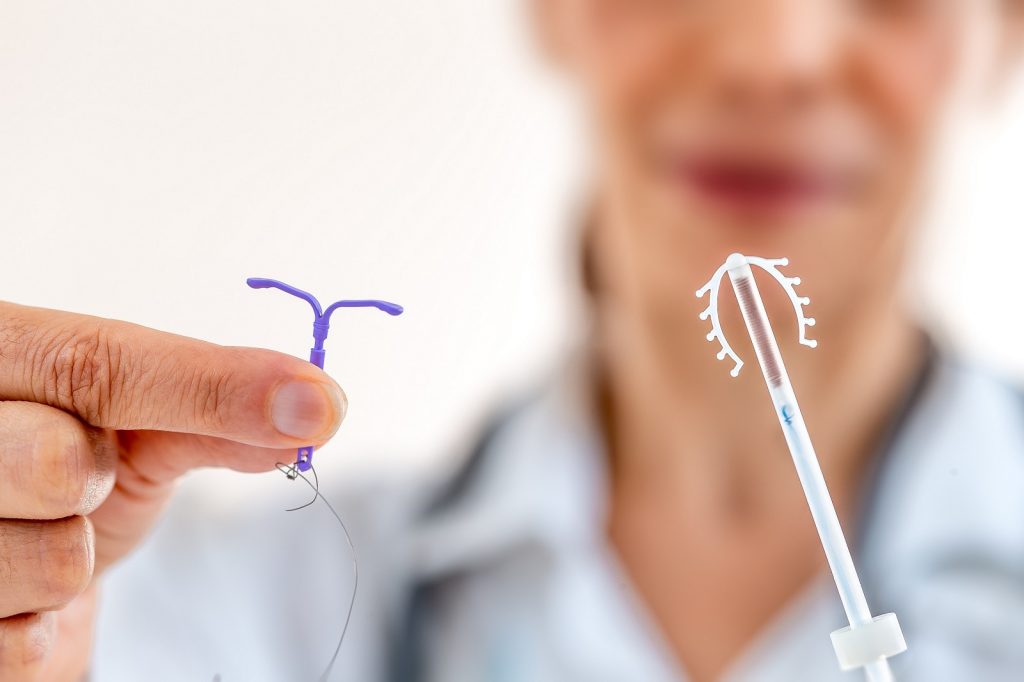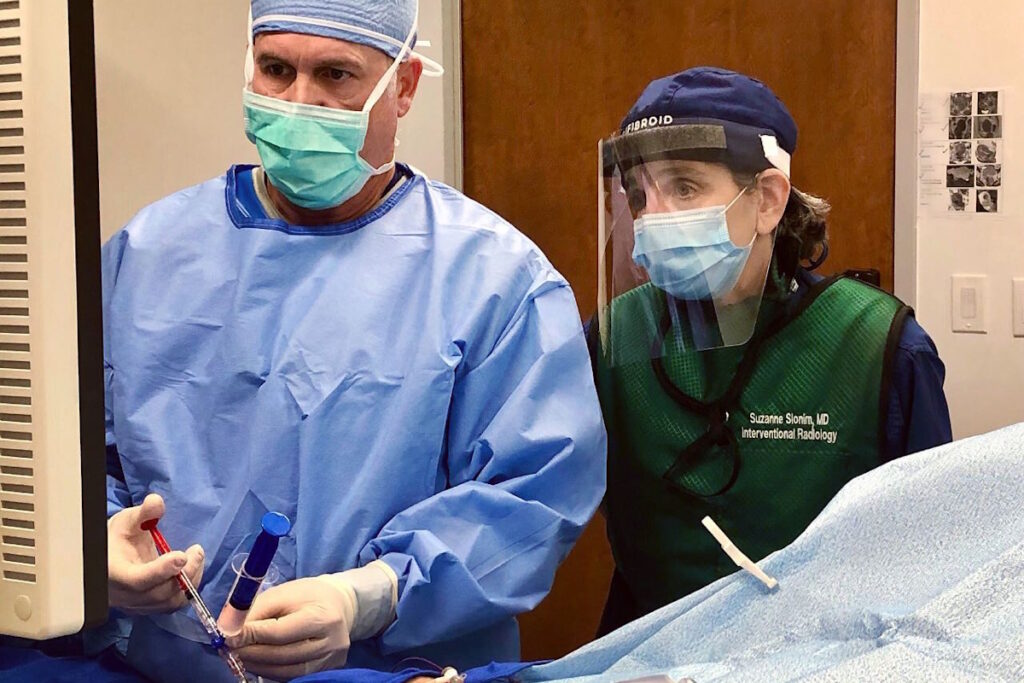Uterine fibroids are non-cancerous growths inside a woman’s uterus. Researchers estimate 70-80% of all women develop fibroids between 35 and 54. However, fibroids can occur in women younger than 35 and until menopause. There’s still some unknowns surrounding fibroids, but what we have learned is that their growth is affected by hormones such as estrogen. This is why so many women develop fibroids during childbearing years—because hormone levels are at their highest. As a result, women with uterine fibroids may wonder if using an intrauterine device (IUD) for birth control will complicate matters and worsen their symptoms. They may have even asked their doctor about IUDs and fibroids, and which contraceptive is best.
There isn’t a simple answer when selecting the best contraceptive. Yes, you can use birth control if you have fibroids, and IUDs are considered one of the most effective methods. But when it comes to IUDs and fibroids, it’s important for you and your doctor to look at your unique situation, the available IUD options, and weigh the effects of each.
IUDs and How They Affect Fibroid Symptoms
An IUD is a small, T-shaped plastic device that is inserted into the uterus to prevent pregnancy. They are 99% effective, meaning fewer than 1 out of 100 women who use them will get pregnant each year. Some women may feel cramps or pain when the IUD is inserted, but it doesn’t last long. While there are five FDA-approved IUDs available today, each with its own advantages and uses, there are only two forms: hormonal and non-hormonal. Which one you choose could make a difference when it comes to your experience with IUDs and fibroids.
About Hormonal IUDs
This form of contraceptive releases a tiny amount of a synthetic hormone called progestin over several years to prevent pregnancy. Progestin is meant to mimic progesterone, which our bodies make naturally. Not only do the hormones in the IUD help prevent pregnancy, but there is a small chance—depending on your situation—that it could lessen your fibroid symptoms. This is because progestin thickens your cervical mucus and thins the uterine lining, leading to a decrease in fibroid symptoms such as:
- Heavy menstrual bleeding
- Painful periods
- Anemia
- Fatigue and weakness
With that being said, there is no proof that IUDs and fibroids are a good match 100% of the time. Because there is a link between hormones and fibroid growth, implanting a hormonal IUD can make your fibroids grow. And depending on the size and location of your fibroids, this can lead to symptoms ranging from pelvic pain or pressure, back pain, incontinence, and pain during sexual intercourse.
About Non-hormonal IUDs
Many women who don’t want to take a chance with hormonal IUDs and fibroids but are still interested in effective birth control still have non-hormonal IUDs as an option. With this form of contraceptive, copper rather than progestin is released into the uterus to create an inhabitable environment for sperm and keep it from getting to the egg for fertilization.
A huge advantage for non-hormonal IUDs is that they last longer, up to 10 or 12 years in some cases. But it is important to note that this type of contraception does not have the ability to improve fibroid symptoms. In some cases, it could cause increased bleeding and cramping. Non-hormonal IUDs also may not be an option for women who are allergic to copper.

What Are the Different Types of IUDs?
Currently, there are four types of FDA-approved hormonal IUDs (Mirena, Liletta, Kyleena, and Skyla). ParaGard is the only non-hormonal IUD approved by the FDA. All types of hormonal IUDs work the same and have the same kind of hormone in them. But there are some subtle differences to be aware of. Let’s look at the differences between each.
1. Mirena
When it comes to IUDs and fibroids, Mirena has been around the longest (2001). It prevents pregnancy for up to six years and is approved to treat heavy periods for up to five years.
2. Liletta
The FDA first approved Liletta in 2015, and it is very similar to Mirena in terms of application, levels of progestin, and overall effectiveness. It was also recently approved for use up to six years as well.
3. Kyleena
There aren’t many differences with Kyleena other than it is smaller than Mirena and Liletta at 1.18 inches. Kyleena is 98.6% effective over 5 years.
4. Skyla
Skyla is still one of the most effective birth control options available today. Unlike its counterparts, however, it works continuously for up to three years.
5. ParaGard
The biggest difference with ParaGard is that it is 100% hormone-free. It has one active ingredient, copper, which is wrapped around the arms and stem. It is equally as effective at preventing pregnancy as its hormonal IUD counterparts and lasts anywhere from 10 to 12 years.
IUDs and Fibroids
Fibroids tend to swell and grow faster during childbearing years when hormone levels are at their highest. There are plenty of birth control options for women with fibroids. Please be advised that fibroid symptom relief—while possible with IUDs and fibroids—is not the same as fibroid treatment. An IUD won’t make your fibroids disappear or stop growing. Therefore, it is important to talk with your doctor about stopping your fibroid symptoms at the root cause.
Thankfully high on the list for fibroid treatment without surgery is a minimally invasive procedure known as Uterine Fibroid Embolization (UFE). This revolutionary procedure restricts blood flow to the fibroids, causing the fibroids to shrink and die. When performed by our board-certified interventional radiologists who specialize in UFE many patients experience a high success rate with minimal discomfort.

Benefits of UFE include:
- In-office procedure instead of hospital stay
- Recovery time is 7-10 days
- No blood loss
- Avoid side effects of pharmaceutical hormone therapies
- All fibroids are treated at the same time
- No incisions, which means no surgical scarring
- Patient keeps her uterus
- Over 90% of patients see dramatic improvement in symptoms
Get Relief from Fibroid Symptoms with Fibroid Institute
It can be confusing when trying to determine if an IUD will be the right option for you and your fibroids situation. The good news is that you can use birth control if you have fibroids. But it takes a consultative approach with your doctor to determine the best course of action for you.
Do you have questions about IUDs and fibroids? At Fibroid Institute Texas, we are dedicated to educating and empowering women on fibroid treatment options. Treatments are offered in the comfort of our offices equipped with advanced medical technology. Our office handles all orders for MRIs and diagnostic scans. We also manage all insurance pre-authorizations.
Most major medical insurance providers cover the cost of UFE. With multiple locations, our Houston and Dallas fibroid centers help thousands of women avoid fibroid surgery but find relief from their fibroid symptoms. Meet some of these women here:
We are dedicated to helping you become #FibroidFree. Get starte
Most insurance companies cover the cost of UFE. Schedule your consultation today with the top fibroid specialist in Texas by calling 214-838-6440 or completing the form below.
"*" indicates required fields
Prior to starting any new treatment or if you have questions regarding a medical condition, always seek the advice of your doctor or other qualified health provider. This information is not a substitute for professional medical advice.
Fibroid Institute Texas serves the Dallas and Houston areas including Addison, Carrollton, Plano, Frisco, Craig Ranch, McKinney, Allen, Fort Worth, Grand Prairie, HEB, Arlington, Hutchins, Irving, Duncanville, DeSoto, Cedar Hill, Lancaster, Cockrell Hill, Highland Park, University Park, Park Cities, Garland, Mesquite, Richardson, Dallas, Sherman, Houston, Sugar Land, Katy, Webster, Clear Lake, The Woodlands, Universal City, Spring, Kingwood, Stafford, Conroe, Texas City, Cypress, League City, Bellaire, and more.

